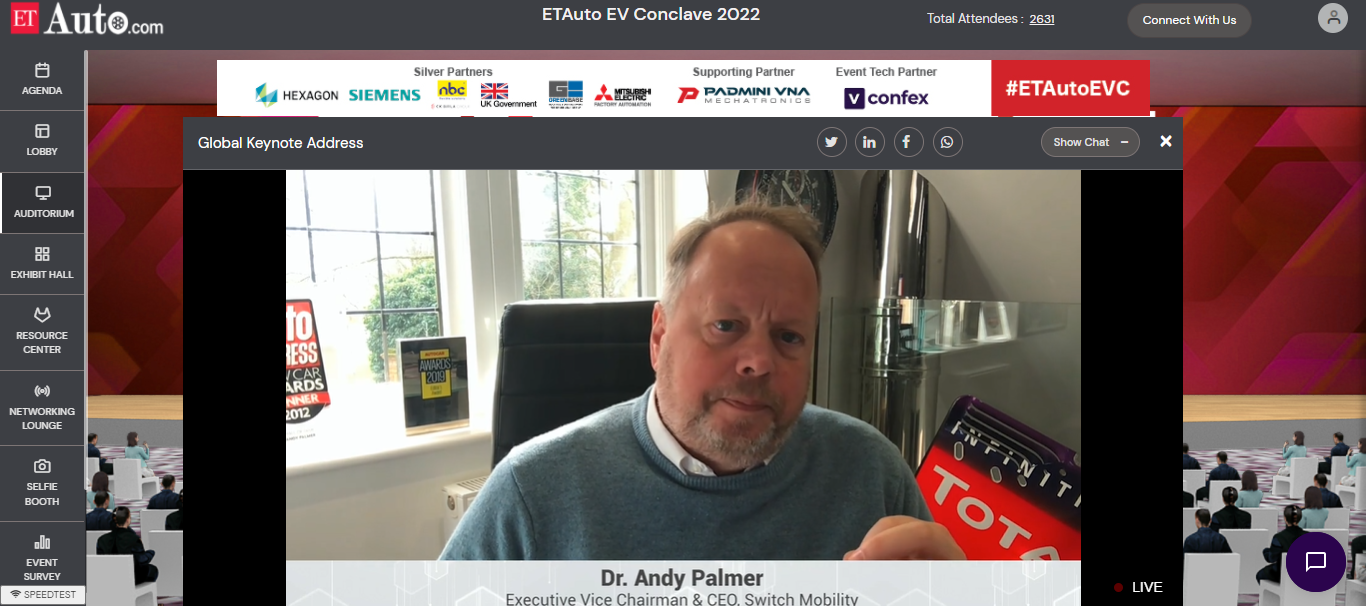
New Delhi:
Electrification is a global megatrend, but it is one country, China, that leads as a sourcing base by a big margin, besides being the largest electric vehicle (EV) market in the world. As the automotive market increasingly gets electrified, location of giga factories, and gigantic scale battery production facilities may determine where the power centres will be in the era of EVs, Andrew (Andy) Palmer, vice-chairman and CEO, Switch Mobility, told the ETAuto EV Conclave.“In reality, it is the location of the battery Giga factories that will determine the location of the future car industry, he said in the context of how China commands a special position as it is the most popular base for sourcing batteries, especially of the LFP (Lithium Iron Phosphate) chemistry.
“This is all very well when one is purely a buyer.” But if any country has to establish itself as a major base for EVs, investments in giga factories, and battery technologies are very important. “If you’re going to invest, and India must invest, then invest in technology that drives you forwards and not in one that ties you geopolitically to China,” the industry veteran said. He had a stint at Nissan as the chief planning officer and had the responsibility of planning for the Nissan Leaf, the world’s first mass-produced electric car.
Lithium Manganese Oxide battery chemistry was used in the Nissan Leaf when it was developed 15 years ago. Today the battery chemistry has changed to Nickel, Manganese, and Cobalt, a more efficient and effective technology that not only enhances battery durability, but also helps it charge faster.
“India deserves to be a pioneer in New energy vehicles, and must boldly innovate, rather than borrowing hand-me-down technologies,” Palmer said. India’s PLI (Production Linked Incentive) programmes could facilitate building the domestic base for battery technologies too. The Government has laid out INR 18,100 crore under the PLI scheme for the ‘National Programme on Advanced Chemistry Cell (ACC) Battery Storage’. Switch Mobility, a subsidiary of Ashok Leyland, stands to be among the beneficiaries of a good domestic EV ecosystem, as it looks to manufacture vehicles in India too.
A strong believer that the electric era has arrived, Palmer is also an advocate of net zero emissions during this period when Governments across the world bring out new regulations for addressing the challenges of pollution and environment degradation. In his 40-year career, he said, one of the key lessons he learnt is that “Legislation is all well and good, as long as the governments know where they want to get to.” To the Governments who plan to shift their countries from fossil fuel-run transportation to clean energy, his message is that they should refrain from picking the replacement solution, but set targets to go clean and challenge the industry to meet them through various means.
“What our political masters must do now is encourage competitiveness, so much so that engineers will battle it out in developing new technologies that enable us to get there. If the petrol and diesel-powered combustion engines are indeed a thing of the past, then governments must not prescribe what it believes to be the replacement technology, because that will end in tears, as it always ends in tears.” In other words, when it comes to drawing a technology roadmap, he’s a subscriber of the adage, ‘Don’t put all your eggs in one basket’.
“If anything, we should diversify our strategy as much as possible. As an industry, we should have a plan A, plan B and Plan C. It is only by doing this, that we can have a plan that is truly resilient to changing circumstances. Batteries will be a dominant source of mobility energy now and in the foreseeable future,” Palmer said. As for EVs, he thinks, they are as inevitable as “death and tax”, but “we have to get them right”.
Also Read:




















